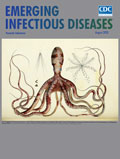
Volume 26, Number 8—August 2020
Dispatch
Increasing Malaria Parasite Clearance Time after Chloroquine Therapy, South Korea, 2000–2016
Seong Yeon Park, Yoon Soo Park, Yoonseon Park, Yee Gyung Kwak, Je Eun Song, Kkot Sil Lee, Shin-Hyeong Cho, Sang-Eun Lee, Hyun-Il Shin, and Joon-Sup Yeom
Abstract
We reviewed the clinical efficacy of chloroquine for Plasmodium vivax malaria, the changing trend of parasite clearance time, and fever clearance time during 2000–2016 in South Korea. Median parasite clearance time and fever clearance time increased significantly over the study period. Chloroquine was mostly underdosed when used to treat P. vivax malaria.
Plasmodium vivax is the only form of malaria indigenous to South Korea (1); combination chloroquine and primaquine therapy has been the mainstay of vivax malaria treatment. After P. vivax reemerged after being eliminated in South Korea in the late 1970s, it mainly occurred in soldiers or veterans stationed in the demilitarized zone between North Korea and South Korea. Because of this focus, mass chloroquine chemoprophylaxis has been administered in place for soldiers working in high-risk areas since 1997 (2,3). However, there is concern that mass chemoprophylaxis might lead to reduced chloroquine susceptibility (2). In addition, soldiers were often given lower doses than that recommended by the World Health Organization (WHO); Commons et al. reported that underdosing of chloroquine was associated with recurrence and increased parasite clearance time (PCT) (4). We studied the trends in South Korea during 2000–2016 for treatment efficacy on the basis of PCT and fever clearance time (FCT).





















.png)












No hay comentarios:
Publicar un comentario